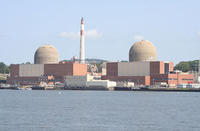-
Promoting mistrust: thwarting spear phishing cyber threats
Information security experts say that the most challenging threat facing corporate networks today is “spear phishing”; generic e-mails asking employees to open malicious attachments, provide confidential information, or follow links to infected Web sites have been around for a long time; what is new today is that the authors of these e-mails are now targeting their attacks using specific knowledge about employees and the organizations they work for; the inside knowledge used in these spear phishing attacks gains the trust of recipients
-
-
New York State power plants showing their age

New York State could face power plant closings in the near future as a result of updated environmental regulations and the fact that plants in the state are outdated and inefficient; a recent report concluded that New York’s coal and nuclear power plants, as well as steam and turbine plants that run on oil or gas, are on average older than others around the country
-
-
Advocates of immigration reform eye Canada’s guest worker program as a model
When many Mexicans head north for seasonal work, they no longer have to smuggle their way through the U.S.–Mexican border; now they can hop a fight to Canada; in a government-to-government deal between Mexico and Canada, almost 16,000 temporary Mexican workers are able to earn good wages in Canada as part of a guest worker program; as discussions about immigration reform in the United States continue, some eye the Canadian guest worker program as a model to be emulated
-
-
France is the forerunner in nuclear power generation – but for how long?
France has been held up, worldwide, as the forerunner in using nuclear fission to produce electricity; a third of the nation’s nuclear reactors, however, will need replacing in the next decade, and public opinion has shifted toward reducing reliance on nuclear power; does France have the means or desire to unplug from nuclear power?
-
-
FDA issues new food safety rules to fight contamination
One in six Americans becomes ill from eating contaminated food each year; most of them recover without harm, but bout 130,000 are hospitalized and 3,000 die; the FDA estimates the new food safety rules could prevent about 1.75 million illnesses each year
-
-
BP settlement includes $350 million funding for Gulf health, environmental protection

As part of the $4 billion settlement announced last month between the federal government and BP concerning the 2010 Deepwater Horizon disaster, the National Academy of Sciences has been asked to establish a new $350 million, 30-year program on human health and environmental protection in the Gulf of Mexico
-
-
Newspaper hires armed guards to watch editorial headquarters
A newspaper in Rockland County, New York offered its readers a map on its Web site which showed the names and addresses of all gun permit holders in Rockland and Westchester counties; worried about an angry reaction to the map, the newspaper hired private security guards to watch over its West Nyack headquarters
-
-
Experts warn of growing threat to aviation: pilot fatigue

Safety expert criticizes EU proposals to relax flight-time limits; his study of pilots’ work found that over 20 percent of them said that by the time they completed their shift, they had been awake for twenty-eight hours or more
-
-
Secure communication technology overcomes lack of trust between communicating parties
Many scenarios in business and communication require that two parties share information without either being sure whether they can trust the other; examples include secure auctions and identification at ATM machines; researchers say that exploiting the strange properties of the quantum world could be the answer to dealing with such distrust
-
-
Less-lethal 12-gauge shotgun round for law enforcement unveiled
Innovative new round flattens, or “pancakes,” across a subject’s body on impact rather than keeping its shape as other rounds do
-
-
Broader background checks, denial criteria may help prevent mass-shooting catastrophes
Garen Wintemute, a leading authority on gun violence prevention and an emergency medicine physician at the University of California, Davis, believes broader criteria for background checks and denials on gun purchases can help prevent future firearm violence, including mass shooting catastrophes such as those that occurred at Sandy Hook, Aurora, Virginia Tech, and Columbine
-
-
The burden of disease links ecology to economic development and growth
According to conventional economic wisdom, the foundation of economic growth is in political and economic institutions; researchers argue that, in fact, vector-borne and parasitic diseases have substantial effects on economic development across the globe, and that these diseases are major drivers of differences in income between tropical and temperate countries; the burden of these diseases is, in turn, determined by underlying ecological factors: it is predicted to rise as biodiversity falls
-
-
Texas drought helps in demonstrating viability of drought-tolerant corn
There is nothing like a couple years of drought to help determine the advances being made in drought-tolerant corn, and the historic drought in Texas in 2011 and in the Corn Belt in 2012 helped Texas A&M scientists show that different types of drought-tolerant corn performed well with far lower levels of irrigation
-
-
Fiscal cliff discussions get in way of post-Sandy relief measure
The post-Sandy rebuilding effort in the northeast has been stalled by the debate going on in Congress about a solution to the national debt
-
-
Part Two: NNSA and private contractors’ “nuclear safety culture” responsible for Y-12 security breach?

After Sister Susan Rice, age 82, and two other senior confederates allegedly broke into the Y-12 National Security Complex at Oak Ridge, Tennessee on 28 July 28th, initial spin on the breach at this highly secured facility focused upon blaming a lone security guard;the security breach at Y-12, however, should be more accurately understood as revealing a more systemic flaw: the breach was not the fault of a single guard, but as a security failure similar to other failures in a number of facilities under the purview of the National Nuclear Security Administration (NNSA) experiencing repeated security and safety lapses
-
More headlines
The long view
Factories First: Winning the Drone War Before It Starts
Wars are won by factories before they are won on the battlefield,Martin C. Feldmann writes, noting that the United States lacks the manufacturing depth for the coming drone age. Rectifying this situation “will take far more than procurement tweaks,” Feldmann writes. “It demands a national-level, wartime-scale industrial mobilization.”
Trump Is Fast-Tracking New Coal Mines — Even When They Don’t Make Economic Sense
In Appalachian Tennessee, mines shut down and couldn’t pay their debts. Now a new one is opening under the guise of an “energy emergency.”
Smaller Nuclear Reactors Spark Renewed Interest in a Once-Shunned Energy Source
In the past two years, half the states have taken action to promote nuclear power, from creating nuclear task forces to integrating nuclear into long-term energy plans.
